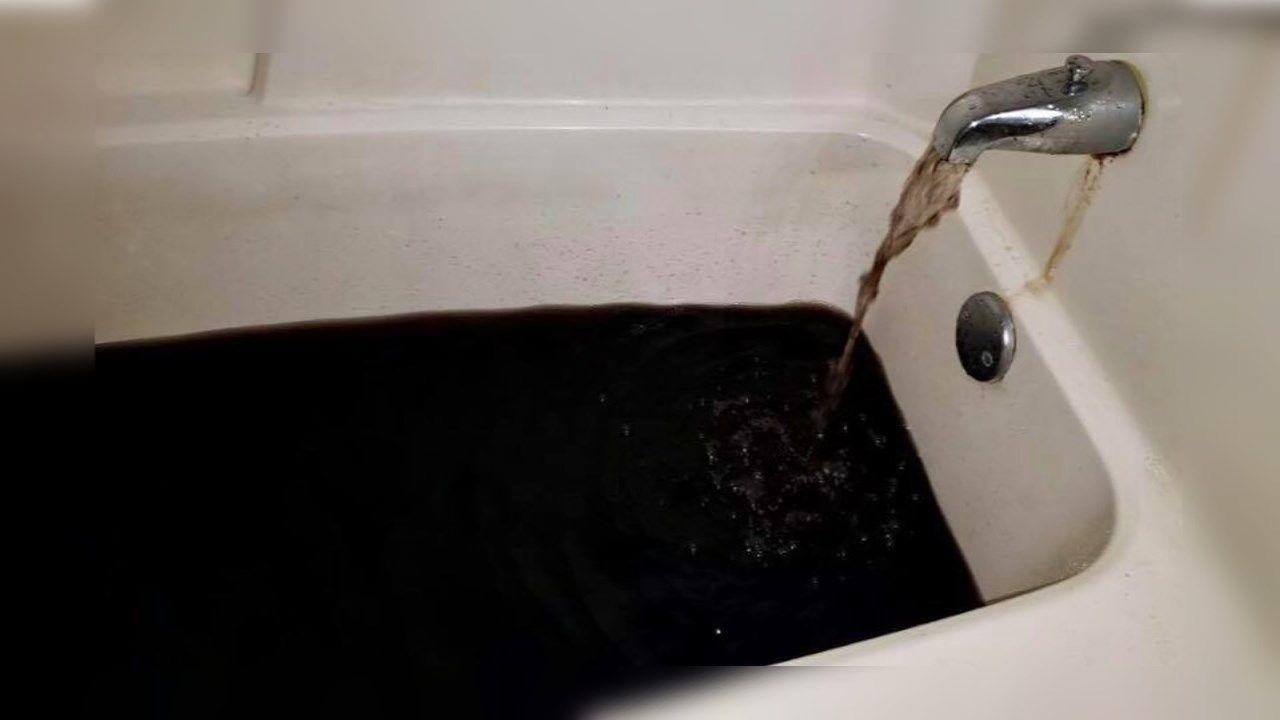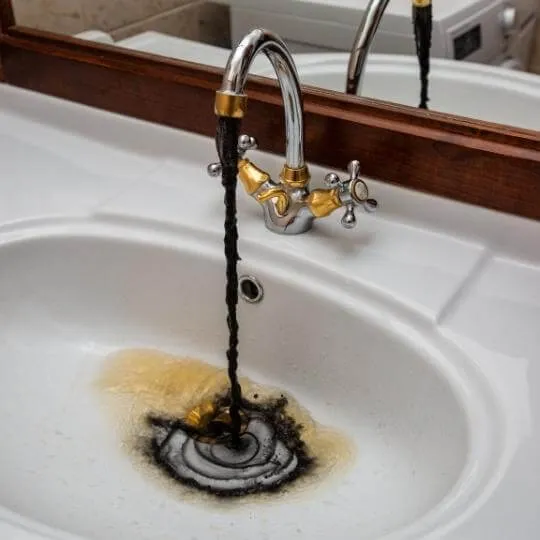Imagine stepping into your bathroom, ready for a relaxing soak, only to be greeted by an unsettling sight: black water pouring out of your tub faucet. You might feel a mix of surprise, concern, and urgency.
What could be causing this mysterious and alarming occurrence? You’re not alone in seeking answers, and addressing this issue promptly is crucial for your peace of mind and the safety of your household. You’ll discover the possible reasons behind the black water, from common plumbing issues to more serious concerns.
You’ll learn how to identify the source of the problem and what steps you can take to fix it. By the end of this read, you’ll be equipped with the knowledge to tackle the issue head-on, ensuring clean and safe water flows through your faucet once again. Don’t let this unexpected situation disrupt your daily routine; dive into the details to regain control and restore your comfort.

Credit: www.reddit.com
Common Causes Of Black Water
Discovering black water flowing from your tub faucet is alarming. This issue can stem from several common causes. Understanding these reasons will help in resolving the problem effectively.
Sediment Buildup
Over time, minerals and sediment accumulate in pipes. These deposits can discolor water, making it appear black. Sediment buildup often occurs in homes with older plumbing systems. Regular maintenance can prevent this issue.
Corroded Pipes
Pipes corrode due to age and water chemistry. Corrosion can lead to black water. This is a sign that pipes might need replacement. Corroded pipes can also affect water quality and safety.
Organic Material
Organic material can find its way into water systems. This includes bacteria, algae, or other natural substances. These materials can cause water discoloration. Ensuring a clean water supply system is crucial to avoid this problem.
Identifying The Source
Black water from a tub faucet might indicate rust in pipes or mineral buildup. It could also suggest deteriorating plumbing. Regular maintenance and inspections can help prevent these issues and ensure clean water flow.
Discovering black water flowing from your tub faucet can be alarming. It’s crucial to identify the source to address the problem effectively. Let’s dive into the potential culprits and figure out what’s causing this unsettling issue.Checking Water Supply
First, examine your water supply. Is the issue occurring in multiple faucets, or is it isolated to your tub? If it’s widespread, the problem could be with your municipal water supply or your home’s main water line. Consider reaching out to your local water utility company. They might be performing maintenance or have reports of similar issues in your area. Often, they can provide quick insights or solutions.Inspecting Plumbing System
Next, turn your attention to your plumbing system. Old pipes can corrode over time, releasing minerals or rust into the water, which may appear black. Have you noticed any other signs of aging in your plumbing, like reduced water pressure or leaks? Inspect visible pipes for signs of corrosion or wear. You might need a professional plumber to check hidden areas. Sometimes, a thorough inspection can uncover issues you didn’t even know existed.Analyzing Water Quality
Finally, analyze the quality of your water. Consider using a home testing kit to check for minerals, bacteria, or other contaminants. The results can provide clues about what’s causing the discoloration. Think about the last time you cleaned or replaced your water filters. Accumulated debris can sometimes mix with your water, leading to unexpected changes in color. A simple replacement might solve the problem. Have you faced similar plumbing issues before? Identifying patterns can help pinpoint recurring problems. Addressing them now can prevent future headaches.Immediate Actions To Take
Discovering black water coming out of your tub faucet can be alarming. It’s a situation that demands quick action to prevent potential damage and maintain your peace of mind. This section outlines immediate steps you can take to address the issue effectively, ensuring you act swiftly and wisely.
Turning Off Water Supply
First and foremost, stop the water flow. Locate the main water valve, usually found in the basement or near the water meter, and turn it off. This prevents further contamination and potential staining in your home.
If you’ve never had to turn off your water supply before, now is a good time to familiarize yourself with its location. Knowing this can save you time and stress in future emergencies.
Contacting A Professional
Once the water is off, it’s crucial to contact a plumbing professional. They can diagnose the problem accurately and offer solutions tailored to your situation. Professionals have the tools and expertise to determine if the issue is due to pipe corrosion, sediment buildup, or something else.
Don’t hesitate to seek recommendations from friends or neighbors; personal experiences can guide you to reliable professionals. Remember, addressing the problem sooner rather than later can prevent costly repairs.
Using Temporary Solutions
While waiting for professional help, there are temporary measures you can employ. Use bottled water for drinking and cooking to avoid ingesting contaminated water. Also, consider using a water filter pitcher for any necessary household water needs.
These solutions are not permanent fixes, but they allow you to maintain a semblance of normalcy during this disruptive time. Have you ever thought about how much we rely on clean water daily?
Taking immediate action when faced with black water from your faucet is crucial. Each step not only mitigates the issue but also provides valuable lessons in home maintenance and preparedness.

Credit: accurateleaklocators.com
Long-term Solutions
Dealing with black water from your tub faucet can be frustrating. It might indicate serious plumbing issues. Addressing this problem requires effective, long-term solutions. These solutions ensure clean and safe water for your home. Let’s explore ways to tackle this issue permanently.
Replacing Old Pipes
Old pipes often cause water discoloration. They may corrode over time, releasing rust into the water. Replacing these pipes with new materials can solve the problem. Copper or PEX pipes are great options. These materials resist corrosion and ensure cleaner water. Consult a professional plumber for an accurate assessment. They can recommend the best pipe replacements for your home.
Installing Water Filtration Systems
Water filtration systems remove impurities from your water supply. They offer a practical solution to eliminate black water issues. These systems filter out sediments and contaminants effectively. Install a whole-house filtration system for comprehensive coverage. This system ensures clean water at every faucet. Consider models with activated carbon filters. They are efficient in removing rust and other particles.
Regular Maintenance Tips
Maintaining your plumbing system prevents future water issues. Regular inspection helps identify potential problems early. Check for leaks or corrosion signs in your pipes. Clean your faucets and showerheads frequently. This prevents mineral buildup that might affect water quality. Schedule professional plumbing assessments annually. This keeps your system in optimal condition. Proper maintenance ensures long-lasting solutions for clean water.
Preventative Measures
Black water coming from your tub faucet can be alarming. It indicates underlying plumbing issues. Taking steps to prevent this can save time and money. Regular checks and upgrades help maintain water quality. Here are some effective preventative measures.
Routine Plumbing Inspections
Regular inspections keep plumbing systems in top condition. A licensed plumber can identify potential issues. This avoids costly repairs later. Schedule inspections every year. Early detection stops problems from escalating.
Water Quality Monitoring
Monitor the quality of your water regularly. Test kits help you check for impurities. They are available at most hardware stores. Contaminants can cause black water. Fixing these issues early ensures safe water.
Upgrading Plumbing Materials
Old pipes can corrode and leak. This leads to black water issues. Consider upgrading to modern, durable materials. Copper and PVC pipes last longer. They reduce the risk of contamination. Invest in quality materials for peace of mind.

Credit: heartlandinspections.com
Frequently Asked Questions
What Causes Black Water In Tub Faucets?
Black water may result from corroded pipes, mineral deposits, or sediment buildup. It’s often due to old plumbing systems.
Is Black Water From Faucets Dangerous?
Yes, it can be. Black water might contain harmful bacteria or metals. It’s best to avoid using it.
How Can I Fix Black Water From The Faucet?
Flush the system by running the water. If it persists, contact a plumber for inspection and repair.
Can Black Water Damage My Plumbing?
Yes, it can lead to further corrosion and damage. Regular maintenance helps prevent long-term issues.
Should I Call A Plumber For Black Water?
Yes, if flushing doesn’t help. A plumber can identify the root cause and provide a solution.
Conclusion
Black water from your tub faucet can be concerning. It often signals plumbing issues. This could include pipe corrosion or mineral build-up. Addressing the problem quickly is important. Ignoring it may lead to more damage. Regular maintenance can prevent future issues.
Checking pipes and water quality helps. Professional plumbers can offer solutions. They ensure your water stays clean and safe. Understanding the cause helps you take action. Keep your home’s plumbing in good health. Your water should always be clear and reliable.
Stay proactive with plumbing care. Your home and health depend on it.





